ITU
-
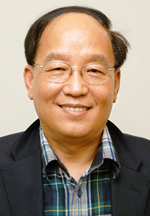 Professor Kwy-Ro Lee Appointed Distinguished Member of IEEE
Professor Kwy-Ro Lee from the Department of Electrical Engineering at KAIST was selected as a distinguished member of the Institute of Electrical and Electronics Engineers (IEEE) where his contribution to research development of the technological management of semiconductors was recognized.
Professor Lee earned his BS from Seoul National University and MS & Ph.D. from the University of Minnesota. He has been working as a professor in the Department of Electrical Engineering since 1986. He has also served as the president of the LG Electronics Research Center in 2005 and the president of the Nanoscience and Technology Center at KAIST in 2010.
IEEE is the largest professional association for the advancement of technology in electrical, electronics, computing and communication with 400,000 members in 160 countries. Only 0.1 percent of members with over ten years of service can be selected as distinguished members based on their research devotion for society.
2014.01.02 View 9218
Professor Kwy-Ro Lee Appointed Distinguished Member of IEEE
Professor Kwy-Ro Lee from the Department of Electrical Engineering at KAIST was selected as a distinguished member of the Institute of Electrical and Electronics Engineers (IEEE) where his contribution to research development of the technological management of semiconductors was recognized.
Professor Lee earned his BS from Seoul National University and MS & Ph.D. from the University of Minnesota. He has been working as a professor in the Department of Electrical Engineering since 1986. He has also served as the president of the LG Electronics Research Center in 2005 and the president of the Nanoscience and Technology Center at KAIST in 2010.
IEEE is the largest professional association for the advancement of technology in electrical, electronics, computing and communication with 400,000 members in 160 countries. Only 0.1 percent of members with over ten years of service can be selected as distinguished members based on their research devotion for society.
2014.01.02 View 9218 -
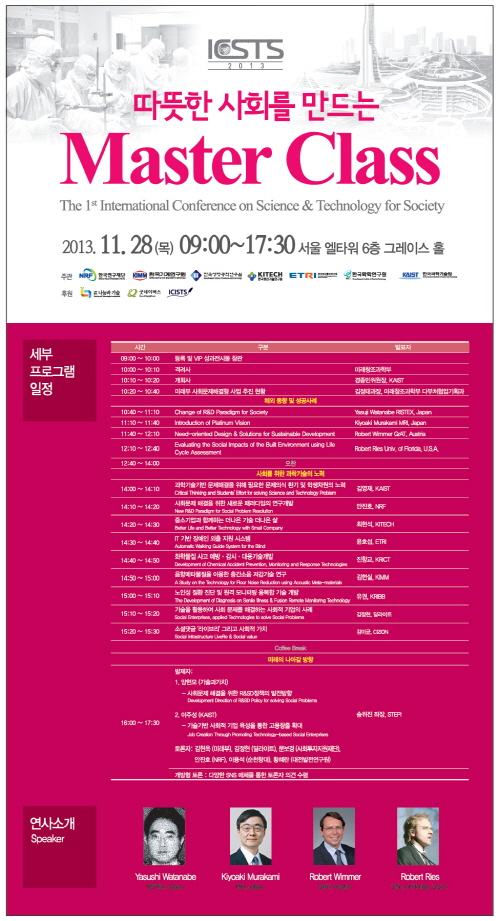 First International Conference on Science and Technology for Society
KAIST co-organized the 2013 International Conference on Science and Technology for Society which was held on November 28 at the Grace Hall in Seoul EL-Tower. More than 300 people, including members of the Global Social Technology Advisory Board, domestic social technology experts, private companies, government officials, private citizens, and students joined the conference to discuss the roles and responsibilities of science and technology for society.
R&D policies and technologies for solving social issues were introduced, and discussions were held on desirable directions for technological development.
The first speaker, Yasushi Watanabe, Director of RISTEX (Research Institute of Science and Technology for Society) in Japan, introduced the importance of science and technology for society under the title “Change of R&D Paradigm for Society.”
Robert Wimmer, GrAT (Center for Appropriate Technology), Vienna University of Technology in Austria, presented “Need-oriented Design & Solutions for Development.” Kiyoaki Murakami, MRI, Japan, presented “Introduction of Platinum Vision” and Robert Ries, University of Florida, U.S.A., presented “Evaluating the Social Impacts of the Built Environment Using Life Cycle Assessment.”
Case studies on social enterprises and presentations on R&D for solving social problems were introduced by ICISTS (International Conference for the Integration of Science, Technology and Society), which is a student group at KAIST, National Research Foundation of Korea (NRF), Korea Institute of Machinery and Materials (KIMM), Korea Research Institute of Bioscience and Biotechnology (KRIBB), Korea Institute of Industrial Technology (KITECH), Electronics and Telecommunication Research Institute (ETRI), and Korea Research Institute of Chemical Technology (KRICT).The conference was hosted by the Ministry of Science, ICT, and Future Planning and co-organized by NRF, KIMM, KRIBB, KITECH, ETRI and KRICT.
2013.12.11 View 13416
First International Conference on Science and Technology for Society
KAIST co-organized the 2013 International Conference on Science and Technology for Society which was held on November 28 at the Grace Hall in Seoul EL-Tower. More than 300 people, including members of the Global Social Technology Advisory Board, domestic social technology experts, private companies, government officials, private citizens, and students joined the conference to discuss the roles and responsibilities of science and technology for society.
R&D policies and technologies for solving social issues were introduced, and discussions were held on desirable directions for technological development.
The first speaker, Yasushi Watanabe, Director of RISTEX (Research Institute of Science and Technology for Society) in Japan, introduced the importance of science and technology for society under the title “Change of R&D Paradigm for Society.”
Robert Wimmer, GrAT (Center for Appropriate Technology), Vienna University of Technology in Austria, presented “Need-oriented Design & Solutions for Development.” Kiyoaki Murakami, MRI, Japan, presented “Introduction of Platinum Vision” and Robert Ries, University of Florida, U.S.A., presented “Evaluating the Social Impacts of the Built Environment Using Life Cycle Assessment.”
Case studies on social enterprises and presentations on R&D for solving social problems were introduced by ICISTS (International Conference for the Integration of Science, Technology and Society), which is a student group at KAIST, National Research Foundation of Korea (NRF), Korea Institute of Machinery and Materials (KIMM), Korea Research Institute of Bioscience and Biotechnology (KRIBB), Korea Institute of Industrial Technology (KITECH), Electronics and Telecommunication Research Institute (ETRI), and Korea Research Institute of Chemical Technology (KRICT).The conference was hosted by the Ministry of Science, ICT, and Future Planning and co-organized by NRF, KIMM, KRIBB, KITECH, ETRI and KRICT.
2013.12.11 View 13416 -
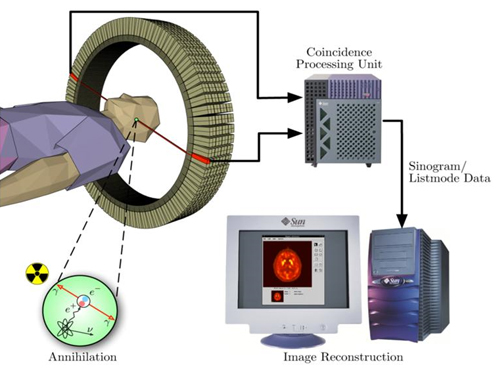 The key to Alzheimer disease, PET-MRI made in Korea
Professor Kyu-Sung Cho
- Simultaneous PET-MRI imaging system commercialization technology developed purely from domestic technology - - Inspiring achievement by KAIST, National NanoFab Center, Sogang University, Seoul National University Hospital –
Hopes are high for the potential of producing domestic products in the field of state-of-the-art medical imaging equipment that used to rely on imported products.
The joint research team (KAIST, Sogang University and Seoul National University) with KAIST Department of Nuclear and Quantum Engineering Professor Kyu-Sung Cho in charge, together with National Nanofab Institution (NNFC; Director Jae-Young Lee), has developed PET-MRI simultaneous imaging system with domestic technology only. The team successfully acquired brain images of 3 volunteers with the newly developed system.
PET-MRI is integrated state-of-the-art medical imaging equipment that combines the advantages of Magnetic Resonance Imaging (MRI) that shows anatomical images of the body and Position Emission Tomography (PET) that analyses cell activity and metabolism. Since the anatomical information and functional information can be seen simultaneously, the device can be used to diagnose early onset Alzheimer’s disease and is essential in biological science research, such as new medicine development.
The existing equipment used to take MRI and PET images separately due to the strong magnetic field generated by MRI and combine the images. Hence, it was time consuming and error-prone due to patient’s movement. There was a need to develop PET that functions within a magnetic field to create a simultaneous imaging system.
The newly developed integral PET-MRI has 3 technical characteristics: 1. PET detector without magnetic interference, 2. PET-MRI integration system, 3.PET-MRI imaging processing.
The PET detector is the most important factor and accounts for half the cost of the whole system. KAIST Professor Cho and NNFC Doctor Woo-Suk Seol’s team successfully developed the Silicon Photomultiplier (amplifies light coming into the radiation detector) that can be used in strong magnetic fields. The developed sensor has a global competitive edge since it optimises semiconductor processing to yield over 95% productivity and around 10% gamma radiation energy resolving power.
Sogang University Department and Electrical Engineering Professor Yong Choi developed cutting edge PET system using a new concept of electric charge signal transmission method and imaging location distinction circuit. The creativity and excellence of the research findings were recognised and hence published on the cover of Medical Physics in June.
Seoul National University Hospital Department of Nuclear Medicine Professor Jae-Sung Lee developed the Silicon Photomultiplier sensor based PET imaging reconstitution programme, MRI imaging based PET imaging revision technology and PET-MRI imaging integration software.
Furthermore, KAIST Department of Electrical Engineering Professor Hyun-Wook Park was responsible for the development of RF Shielding technology that enables simultaneous installation of PET and MRI and using this technology, he developed a head coil for the brain that can be connected to PET for installation.
Based on the technology describe above, the joint research team successfully developed PET-MRI system for brains and acquired PET-MRI integrated brain images from 3 volunteers last June.
In particular, this system has the distinct feature of a detachable PET module and MRI head coil to the existing whole body MRI, so that PET-MRI simultaneous imaging is possible with low installation cost.
Professor Cho said, “We have prepared the foundation of domestic commercial PET and the system has a competitive edge in the global market of PET-MRI system technology.” He continued, “It can reduce the cost of the increasing brain related disease diagnosis, including Alzheimer’s, dramatically.”
Funded by Ministry of Trade, Industry and Energy as an Industrial Foundation Technology Development Project (98 billion won in 7 years), the research applied for over 20 patents and 20 CSI theses.
Figure 1.Brain phantom images from developed PET-MRI system
Figure 2. Brain images from developed PET-MRI system
Figure 3. Domestic PET-MRI clinical trial
Figure 4. Head RF coil and PET detector inserted in MRI
Figure 5. Insertion type PET detector module
Figure 6. Silicon Photomultiplier sensor (Left) and flash crystal block (right)
Figure7. Silicon Photomultiplier sensor
Figure 8. PET detection principle
2013.11.28 View 15449
The key to Alzheimer disease, PET-MRI made in Korea
Professor Kyu-Sung Cho
- Simultaneous PET-MRI imaging system commercialization technology developed purely from domestic technology - - Inspiring achievement by KAIST, National NanoFab Center, Sogang University, Seoul National University Hospital –
Hopes are high for the potential of producing domestic products in the field of state-of-the-art medical imaging equipment that used to rely on imported products.
The joint research team (KAIST, Sogang University and Seoul National University) with KAIST Department of Nuclear and Quantum Engineering Professor Kyu-Sung Cho in charge, together with National Nanofab Institution (NNFC; Director Jae-Young Lee), has developed PET-MRI simultaneous imaging system with domestic technology only. The team successfully acquired brain images of 3 volunteers with the newly developed system.
PET-MRI is integrated state-of-the-art medical imaging equipment that combines the advantages of Magnetic Resonance Imaging (MRI) that shows anatomical images of the body and Position Emission Tomography (PET) that analyses cell activity and metabolism. Since the anatomical information and functional information can be seen simultaneously, the device can be used to diagnose early onset Alzheimer’s disease and is essential in biological science research, such as new medicine development.
The existing equipment used to take MRI and PET images separately due to the strong magnetic field generated by MRI and combine the images. Hence, it was time consuming and error-prone due to patient’s movement. There was a need to develop PET that functions within a magnetic field to create a simultaneous imaging system.
The newly developed integral PET-MRI has 3 technical characteristics: 1. PET detector without magnetic interference, 2. PET-MRI integration system, 3.PET-MRI imaging processing.
The PET detector is the most important factor and accounts for half the cost of the whole system. KAIST Professor Cho and NNFC Doctor Woo-Suk Seol’s team successfully developed the Silicon Photomultiplier (amplifies light coming into the radiation detector) that can be used in strong magnetic fields. The developed sensor has a global competitive edge since it optimises semiconductor processing to yield over 95% productivity and around 10% gamma radiation energy resolving power.
Sogang University Department and Electrical Engineering Professor Yong Choi developed cutting edge PET system using a new concept of electric charge signal transmission method and imaging location distinction circuit. The creativity and excellence of the research findings were recognised and hence published on the cover of Medical Physics in June.
Seoul National University Hospital Department of Nuclear Medicine Professor Jae-Sung Lee developed the Silicon Photomultiplier sensor based PET imaging reconstitution programme, MRI imaging based PET imaging revision technology and PET-MRI imaging integration software.
Furthermore, KAIST Department of Electrical Engineering Professor Hyun-Wook Park was responsible for the development of RF Shielding technology that enables simultaneous installation of PET and MRI and using this technology, he developed a head coil for the brain that can be connected to PET for installation.
Based on the technology describe above, the joint research team successfully developed PET-MRI system for brains and acquired PET-MRI integrated brain images from 3 volunteers last June.
In particular, this system has the distinct feature of a detachable PET module and MRI head coil to the existing whole body MRI, so that PET-MRI simultaneous imaging is possible with low installation cost.
Professor Cho said, “We have prepared the foundation of domestic commercial PET and the system has a competitive edge in the global market of PET-MRI system technology.” He continued, “It can reduce the cost of the increasing brain related disease diagnosis, including Alzheimer’s, dramatically.”
Funded by Ministry of Trade, Industry and Energy as an Industrial Foundation Technology Development Project (98 billion won in 7 years), the research applied for over 20 patents and 20 CSI theses.
Figure 1.Brain phantom images from developed PET-MRI system
Figure 2. Brain images from developed PET-MRI system
Figure 3. Domestic PET-MRI clinical trial
Figure 4. Head RF coil and PET detector inserted in MRI
Figure 5. Insertion type PET detector module
Figure 6. Silicon Photomultiplier sensor (Left) and flash crystal block (right)
Figure7. Silicon Photomultiplier sensor
Figure 8. PET detection principle
2013.11.28 View 15449 -
 Cambridge University Press and HISTAC to Publish Science and Civilization in Korea
The KAIST Research Institute for the History of Science, Technology and Civilization of Korea (HISTAC) and Cambridge University Press have agreed to publish a 10-volume collection entitled “Science and Civilization in Korea” in collaboration with the Needham Research Institute.
HISTAC was found in December 2012 with the support of the Academy of Korean Studies and the Korean Studies Promotion Service with the aim of publishing a collection composed of 30 Korean books and 7 English books on Korean science and civilization.
By November 2013, the HISTAC research team submitted a research paper composed of 11 Korean and 1 English book. It has now exceeded its initial goal of publishing 7 English books by signing the recent agreement with the Cambridge University Press.
“Science and Civilization in Korea” is the second collection of non-western science to be published by the Cambridge University Press since 1954 following “Science and Civilization in China” by Joseph Needham who is well-known for his momentous achievements in history of science in East Asia. This collection will highlight the achievements of Korea in science and civilization of Korea, much of which has been under-valued compared to those of China and Japan.[ It now has the significance similar to the Western science and civilization].
HISTAC appointed Professor Hong-Gi Yoon from the University of Auckland as the translator and invited Professor Christopher Cullen from Cambridge University and Professor Morris Low from the University of Queensland as co-editors. Professor Cullen was an editor of “Science and Civilization in China” and is now the director of the Needham Research Institute and Professor Low is an expert in modern science of East Asia.
The series includes:
- History of Science and Technology in Korea
- Technology, Everyday Life, and Korean Civilization
- History and Cultural Studies of Geomancy in Korea
- Patients, Doctors and the State: History of Korean Medical and Pharmaceutical Culture
- History of Astronomy in Korea
- Mathematics and the History of Korean Civilization
- The West and Korea in the History of Science and Technology, 1600-1950
- Imperialism, Colonialism, Post-colonialism and Technological Science in Korea
- Development of Science and Technology Under the Korean Authoritarian Regime
- Dynamics of Technological Development in Korean Industrialization
The HISTAC team believes that the publication will illuminate the nation’s triumphs in science and technology and expects that the publication will serve as valuable research resources for the study of the history of East Asian scientific civilization which has mainly focused on China and Japan. Further, by adopting various case studies of scientific achievements of South Korea and developing countries, they hope to propose a new model for studying history of science and civilization.
2013.11.28 View 10104
Cambridge University Press and HISTAC to Publish Science and Civilization in Korea
The KAIST Research Institute for the History of Science, Technology and Civilization of Korea (HISTAC) and Cambridge University Press have agreed to publish a 10-volume collection entitled “Science and Civilization in Korea” in collaboration with the Needham Research Institute.
HISTAC was found in December 2012 with the support of the Academy of Korean Studies and the Korean Studies Promotion Service with the aim of publishing a collection composed of 30 Korean books and 7 English books on Korean science and civilization.
By November 2013, the HISTAC research team submitted a research paper composed of 11 Korean and 1 English book. It has now exceeded its initial goal of publishing 7 English books by signing the recent agreement with the Cambridge University Press.
“Science and Civilization in Korea” is the second collection of non-western science to be published by the Cambridge University Press since 1954 following “Science and Civilization in China” by Joseph Needham who is well-known for his momentous achievements in history of science in East Asia. This collection will highlight the achievements of Korea in science and civilization of Korea, much of which has been under-valued compared to those of China and Japan.[ It now has the significance similar to the Western science and civilization].
HISTAC appointed Professor Hong-Gi Yoon from the University of Auckland as the translator and invited Professor Christopher Cullen from Cambridge University and Professor Morris Low from the University of Queensland as co-editors. Professor Cullen was an editor of “Science and Civilization in China” and is now the director of the Needham Research Institute and Professor Low is an expert in modern science of East Asia.
The series includes:
- History of Science and Technology in Korea
- Technology, Everyday Life, and Korean Civilization
- History and Cultural Studies of Geomancy in Korea
- Patients, Doctors and the State: History of Korean Medical and Pharmaceutical Culture
- History of Astronomy in Korea
- Mathematics and the History of Korean Civilization
- The West and Korea in the History of Science and Technology, 1600-1950
- Imperialism, Colonialism, Post-colonialism and Technological Science in Korea
- Development of Science and Technology Under the Korean Authoritarian Regime
- Dynamics of Technological Development in Korean Industrialization
The HISTAC team believes that the publication will illuminate the nation’s triumphs in science and technology and expects that the publication will serve as valuable research resources for the study of the history of East Asian scientific civilization which has mainly focused on China and Japan. Further, by adopting various case studies of scientific achievements of South Korea and developing countries, they hope to propose a new model for studying history of science and civilization.
2013.11.28 View 10104 -
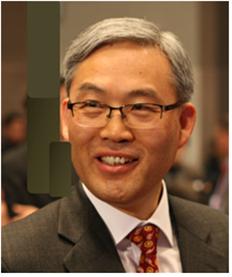 Professor Chun-Taek Rim Appointed as Associate Editor for IEEE TPEL
Professor Chun-Taek Rim of the nuclear and quantum engineering at KAIST was appointed as an associate editor of the Institute of Electrical and Electronics Engineers (IEEE) Transactions on Power Electronics (TPEL), an eminent academic journal bio-monthly published in the field of power electronics.The journal has a high impact factor (4.08), a measure reflecting the average number of citations to recent articles published in an academic journal, which ranks as the 6th the most influential journal among the 100 journals published by IEEE.Professor Rim was also appointed to an associate editor for IEEE Journal of Emerging and Selected Topics in Power Electronics in September in recognition of his expertise in wireless power and electric vehicles.
2013.11.15 View 12101
Professor Chun-Taek Rim Appointed as Associate Editor for IEEE TPEL
Professor Chun-Taek Rim of the nuclear and quantum engineering at KAIST was appointed as an associate editor of the Institute of Electrical and Electronics Engineers (IEEE) Transactions on Power Electronics (TPEL), an eminent academic journal bio-monthly published in the field of power electronics.The journal has a high impact factor (4.08), a measure reflecting the average number of citations to recent articles published in an academic journal, which ranks as the 6th the most influential journal among the 100 journals published by IEEE.Professor Rim was also appointed to an associate editor for IEEE Journal of Emerging and Selected Topics in Power Electronics in September in recognition of his expertise in wireless power and electric vehicles.
2013.11.15 View 12101 -
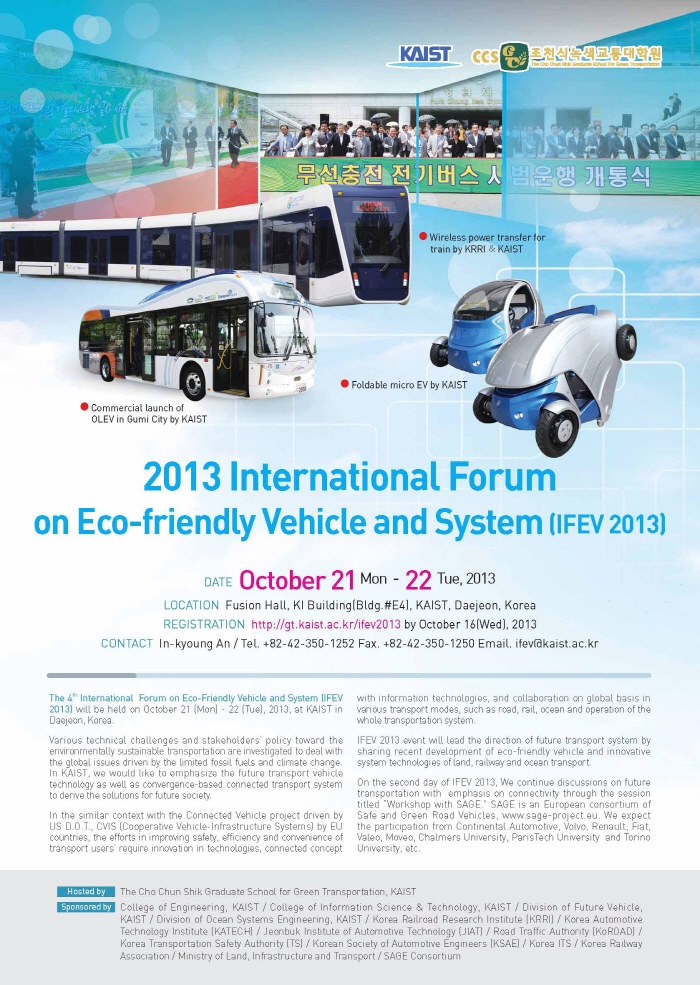 2013 International Forum on Eco-Friendly Vehicle and System
Leaders in transportation technology gathered at KAIST to discuss commercialization & standardization and to encourage the exchange of research progress, strategy, and future initiatives in transportation technology.
The Graduate School for Green Transportation at KAIST hosted the 2013 International Forum on Eco-friendly Vehicles and Systems (IFEV) in Fusion Hall of the KAIST Institute Building from October 21 to 22.
About 50 leaders in the field of future transportation from academic institutes and industries including Dr. Soon-Man Hong, President of Korea Railroad Research Institute (KRRI), Dr. Kwang-Hee Nam, Professor at Pohang University of Science and Technology (POSTECH), and Mr. Mike Schagrin, the Intelligent Transportation Systems Program Manager of the US Department of Transportation (retired) participated in the 4th annual IFEV.
The commercialization & standardization session and a technical session were followed by the plenary meeting of the forum.
Dr. Hong, the keynote speaker, introduced the High Capacity Double Deck High Speed Train, Near Surface Subway System, and Urban Railway System with Wireless Power Transfer Technology under the title “Korea’s Policy and Technology Initiative for Enhancing Green Transport Systems.”
Dr. Kwang-Hee Nam presented “Electric Vehicle Trends & the POSTECH E-Car Research Center Power Train Design,” followed by Mr. Mike Schagrin who spoke about “Going Green with Connected Automation.”
Dr. Omer C. Onar from the Oak Ridge National Laboratory (ORNL) shared recent research on “ORNL Development in Stationary and Dynamic Wireless Charging.”
In the commercialization session, Faical Turki of Vahle, Germany, presented “Wireless Inductive Battery Chargers,” and Professor Kazuyuki Ouchi from Tokyo University presented “Wind Challenger, the Next Generation Hybrid Vessels.”
In the technical session, presentations and discussions were performed on future ground vehicles and railroad technology, intelligent transportation systems and strategy, and policy on eco-friendly vehicle technology, including Professor In-Soo Suh of the Graduate School for Green Transportation at KAIST who presented on “Armadillo-T: 4WD Micro Electric EV with a Foldable Body Concept.”
On the second day of IFEV 2013, representatives of the European Union’s Safe and Green Road Vehicles (SAGE) consortium discussed connectivity in road transportation as a means of improving safety, efficiency and convenience in future safe and green vehicles with collaboration from Korean transportation organizations such as the Korea Transport Institute and Electronics and Telecommunications Research Institute.
Professor Suh, who organized the forum, said, “This forum will serve as an excellent opportunity to discuss and share R&BD progress in the green transportation field. “Details can be found at http://gt.kaist.ac.kr/ifev2013/.
2013.11.15 View 14108
2013 International Forum on Eco-Friendly Vehicle and System
Leaders in transportation technology gathered at KAIST to discuss commercialization & standardization and to encourage the exchange of research progress, strategy, and future initiatives in transportation technology.
The Graduate School for Green Transportation at KAIST hosted the 2013 International Forum on Eco-friendly Vehicles and Systems (IFEV) in Fusion Hall of the KAIST Institute Building from October 21 to 22.
About 50 leaders in the field of future transportation from academic institutes and industries including Dr. Soon-Man Hong, President of Korea Railroad Research Institute (KRRI), Dr. Kwang-Hee Nam, Professor at Pohang University of Science and Technology (POSTECH), and Mr. Mike Schagrin, the Intelligent Transportation Systems Program Manager of the US Department of Transportation (retired) participated in the 4th annual IFEV.
The commercialization & standardization session and a technical session were followed by the plenary meeting of the forum.
Dr. Hong, the keynote speaker, introduced the High Capacity Double Deck High Speed Train, Near Surface Subway System, and Urban Railway System with Wireless Power Transfer Technology under the title “Korea’s Policy and Technology Initiative for Enhancing Green Transport Systems.”
Dr. Kwang-Hee Nam presented “Electric Vehicle Trends & the POSTECH E-Car Research Center Power Train Design,” followed by Mr. Mike Schagrin who spoke about “Going Green with Connected Automation.”
Dr. Omer C. Onar from the Oak Ridge National Laboratory (ORNL) shared recent research on “ORNL Development in Stationary and Dynamic Wireless Charging.”
In the commercialization session, Faical Turki of Vahle, Germany, presented “Wireless Inductive Battery Chargers,” and Professor Kazuyuki Ouchi from Tokyo University presented “Wind Challenger, the Next Generation Hybrid Vessels.”
In the technical session, presentations and discussions were performed on future ground vehicles and railroad technology, intelligent transportation systems and strategy, and policy on eco-friendly vehicle technology, including Professor In-Soo Suh of the Graduate School for Green Transportation at KAIST who presented on “Armadillo-T: 4WD Micro Electric EV with a Foldable Body Concept.”
On the second day of IFEV 2013, representatives of the European Union’s Safe and Green Road Vehicles (SAGE) consortium discussed connectivity in road transportation as a means of improving safety, efficiency and convenience in future safe and green vehicles with collaboration from Korean transportation organizations such as the Korea Transport Institute and Electronics and Telecommunications Research Institute.
Professor Suh, who organized the forum, said, “This forum will serve as an excellent opportunity to discuss and share R&BD progress in the green transportation field. “Details can be found at http://gt.kaist.ac.kr/ifev2013/.
2013.11.15 View 14108 -
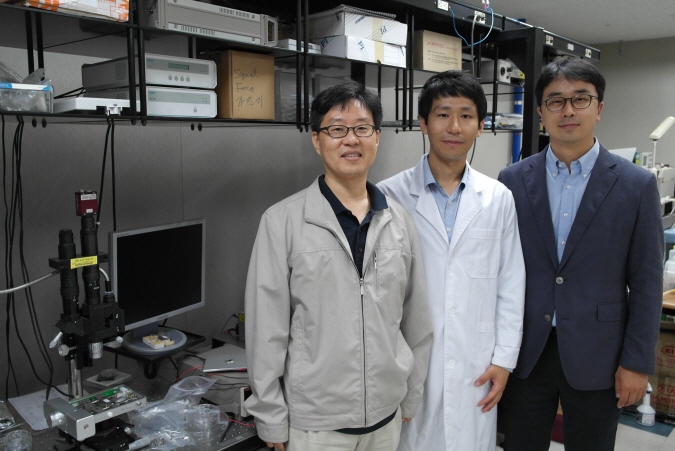 Observation of a water strider led to a new method of measuring properties of Nano films
Even the mechanical properties of Nano films of a few nanometers thick can be measured
Posted online Nature Communications on the 3rd of October
The joint research team of KAIST’s Department of Mechanical Engineering’s Professor Taek-Soo Kim and Doctor Seung-Min Hyun of the Nano mechanics laboratory of Korea Institute of Machinery and Materials has developed a new method to evaluate mechanical properties of Nano films using the characteristics of water surfaces.
The research findings have been posted on the online edition of Nature Communications on the 3rd of October. The technology can obtain accurate results by directly measuring the mechanical properties such as the strength and elasticity of Nano films. Academia and the industry expect the simplicity of the technology to present a new paradigm in the evaluation of mechanical properties of Nano films.
Evaluation of the mechanical properties of Nano films is essential not only in predicting the reliability of semiconductors and displays, but also in finding new phenomena in the Nano world. However, mechanical strength was difficult to test since the test demands the falling of objects to the ground to measure their strength, and nano films can easily break in the process.
The research team observed insects such as water striders freely floating on the surface of the water. The team used the properties of water, large surface tension and low viscosity, to float a 55 nanometers (nm) gold Nano film to successfully measure its mechanical properties without damaging it. The technology could be used to measure the mechanical properties of not only various types of Nano films but also films only a few nm thick.
Professor Taek-Soo Kim said, “We effectively performed an evaluation of the mechanical characteristics of Nano films, which was difficult in the past, by developing a new strength test using the properties of water.” He continued to say, “The team plans to discover the mechanical properties of 2D Nano films such as graphene that could not have been measured with the existing strength test methods.”
The research by KAIST’s Department of Mechanical Engineering’s graduate student Jae-Han Kim (lead author) under the supervision of Professor Taek-Soo Kim and Doctor Seung-Min Hyun of Korea Institute of Machinery and Materials was sponsored by the National Research Foundation of Korea.
Evaluation process of mechanical properties of Nano films by using the characteristics of water surfaces
Dr Seung-Min Hyun, Jae-Han Kim, and Professor Taek-Soo Kim from left to right
2013.11.11 View 9875
Observation of a water strider led to a new method of measuring properties of Nano films
Even the mechanical properties of Nano films of a few nanometers thick can be measured
Posted online Nature Communications on the 3rd of October
The joint research team of KAIST’s Department of Mechanical Engineering’s Professor Taek-Soo Kim and Doctor Seung-Min Hyun of the Nano mechanics laboratory of Korea Institute of Machinery and Materials has developed a new method to evaluate mechanical properties of Nano films using the characteristics of water surfaces.
The research findings have been posted on the online edition of Nature Communications on the 3rd of October. The technology can obtain accurate results by directly measuring the mechanical properties such as the strength and elasticity of Nano films. Academia and the industry expect the simplicity of the technology to present a new paradigm in the evaluation of mechanical properties of Nano films.
Evaluation of the mechanical properties of Nano films is essential not only in predicting the reliability of semiconductors and displays, but also in finding new phenomena in the Nano world. However, mechanical strength was difficult to test since the test demands the falling of objects to the ground to measure their strength, and nano films can easily break in the process.
The research team observed insects such as water striders freely floating on the surface of the water. The team used the properties of water, large surface tension and low viscosity, to float a 55 nanometers (nm) gold Nano film to successfully measure its mechanical properties without damaging it. The technology could be used to measure the mechanical properties of not only various types of Nano films but also films only a few nm thick.
Professor Taek-Soo Kim said, “We effectively performed an evaluation of the mechanical characteristics of Nano films, which was difficult in the past, by developing a new strength test using the properties of water.” He continued to say, “The team plans to discover the mechanical properties of 2D Nano films such as graphene that could not have been measured with the existing strength test methods.”
The research by KAIST’s Department of Mechanical Engineering’s graduate student Jae-Han Kim (lead author) under the supervision of Professor Taek-Soo Kim and Doctor Seung-Min Hyun of Korea Institute of Machinery and Materials was sponsored by the National Research Foundation of Korea.
Evaluation process of mechanical properties of Nano films by using the characteristics of water surfaces
Dr Seung-Min Hyun, Jae-Han Kim, and Professor Taek-Soo Kim from left to right
2013.11.11 View 9875 -
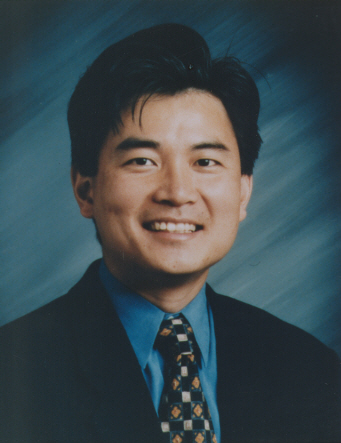 Professor Jae-Hyung Lee appointed as AIChE fellow
Professor Jae-Hyung Lee from the Department of Chemical and Bimolecular Engineering at KAIST was appointed as a fellow in the American Institute of Chemical Engineers (AIChE).
Established in 1908, AIChE is the largest association of chemical engineers worldwide, which now boasts more than 40,000 members from 90 countries.
Following Distinguished Professor Sang Yup Lee from the same department at KAIST, Professor Jae-Hyung Lee is the second Korean appointed as a fellow by the organization.
He has been acknowledged for his innovative research on the improvement of model predictive control of industrial processes.
Professor Lee is the director of the Saudi Armaco-KAIST CO2 Management Center at KAIST, a fellow of the Institute of Electrical and Electronics Engineers (IEEE) and the International Federation of Automatic Control (IFAC), and a member of the Korean Academy of Science and Technology.
He received the Young Investigator Award from the National Science Foundation (NSF) in 1994 and the Computing in Chemical Engineering Award from AIChE in 2013.
2013.11.05 View 10891
Professor Jae-Hyung Lee appointed as AIChE fellow
Professor Jae-Hyung Lee from the Department of Chemical and Bimolecular Engineering at KAIST was appointed as a fellow in the American Institute of Chemical Engineers (AIChE).
Established in 1908, AIChE is the largest association of chemical engineers worldwide, which now boasts more than 40,000 members from 90 countries.
Following Distinguished Professor Sang Yup Lee from the same department at KAIST, Professor Jae-Hyung Lee is the second Korean appointed as a fellow by the organization.
He has been acknowledged for his innovative research on the improvement of model predictive control of industrial processes.
Professor Lee is the director of the Saudi Armaco-KAIST CO2 Management Center at KAIST, a fellow of the Institute of Electrical and Electronics Engineers (IEEE) and the International Federation of Automatic Control (IFAC), and a member of the Korean Academy of Science and Technology.
He received the Young Investigator Award from the National Science Foundation (NSF) in 1994 and the Computing in Chemical Engineering Award from AIChE in 2013.
2013.11.05 View 10891 -
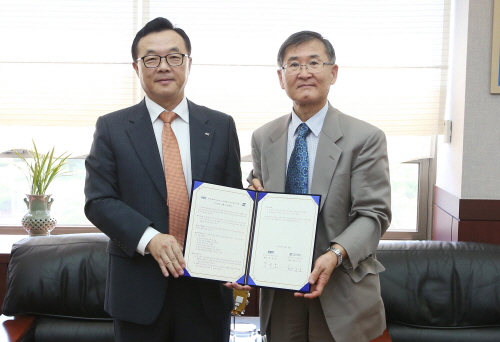 Collaboration with Korea Institute of Energy Research
KAIST and the Korea Institute of Energy Research (KIER) agreed on September 4th to further collaboration on energy research such as the development of nano-based hybrid solar cells, bio-fuels, artificial photosynthesis, and carbon dioxide reduction.
The two institutions will select 11 research projects to focus on their cooperation. President Steve Kang (in the right) stood with Jooho Whang, the president of KIER (in the left), holding the signed memorandum of understanding.
2013.11.04 View 9146
Collaboration with Korea Institute of Energy Research
KAIST and the Korea Institute of Energy Research (KIER) agreed on September 4th to further collaboration on energy research such as the development of nano-based hybrid solar cells, bio-fuels, artificial photosynthesis, and carbon dioxide reduction.
The two institutions will select 11 research projects to focus on their cooperation. President Steve Kang (in the right) stood with Jooho Whang, the president of KIER (in the left), holding the signed memorandum of understanding.
2013.11.04 View 9146 -
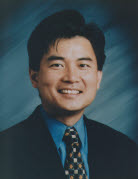 Professor Jay H. Lee to receive the 2013 AIChE CAST Computing in Chemical Engineering Award
Professor Jay H. Lee of Chemical and Biomolecular Engineering Department at KAIST has won the 2013 Computing in Chemical Engineering Award of AIChE"s CAST Division (AIChE, American Institute of Chemical Engineers and CAST, Computing & Systems Technology Division).
The CAST Computing in Chemical Engineering Award, sponsored by The Dow Chemical Company, is annually given to an individual who has made outstanding contributions in the application of computing and systems technology to chemical engineering.Professor Lee has been recognized for his pioneering research contributions for “novel paradigms for much improved and robust model predictive control in industrial processes.” He is currently the Head of Chemical and Biomolecular Engineering Department and Director of Brain Korea (BK) 21 Program at the department. BK21 is the Korean government’s initiative to support the growth of research universities in the nation and foster highly trained master’s and doctoral students as well as researchers.
The CAST Computing in Chemical Engineering Award will be presented to Professor Jay H. Lee at the CAST Division dinner to be held at the AIChE Annual Meeting this November in San Francisco, where he will also deliver the after dinner lecture associated with this award.
2013.06.12 View 11825
Professor Jay H. Lee to receive the 2013 AIChE CAST Computing in Chemical Engineering Award
Professor Jay H. Lee of Chemical and Biomolecular Engineering Department at KAIST has won the 2013 Computing in Chemical Engineering Award of AIChE"s CAST Division (AIChE, American Institute of Chemical Engineers and CAST, Computing & Systems Technology Division).
The CAST Computing in Chemical Engineering Award, sponsored by The Dow Chemical Company, is annually given to an individual who has made outstanding contributions in the application of computing and systems technology to chemical engineering.Professor Lee has been recognized for his pioneering research contributions for “novel paradigms for much improved and robust model predictive control in industrial processes.” He is currently the Head of Chemical and Biomolecular Engineering Department and Director of Brain Korea (BK) 21 Program at the department. BK21 is the Korean government’s initiative to support the growth of research universities in the nation and foster highly trained master’s and doctoral students as well as researchers.
The CAST Computing in Chemical Engineering Award will be presented to Professor Jay H. Lee at the CAST Division dinner to be held at the AIChE Annual Meeting this November in San Francisco, where he will also deliver the after dinner lecture associated with this award.
2013.06.12 View 11825 -
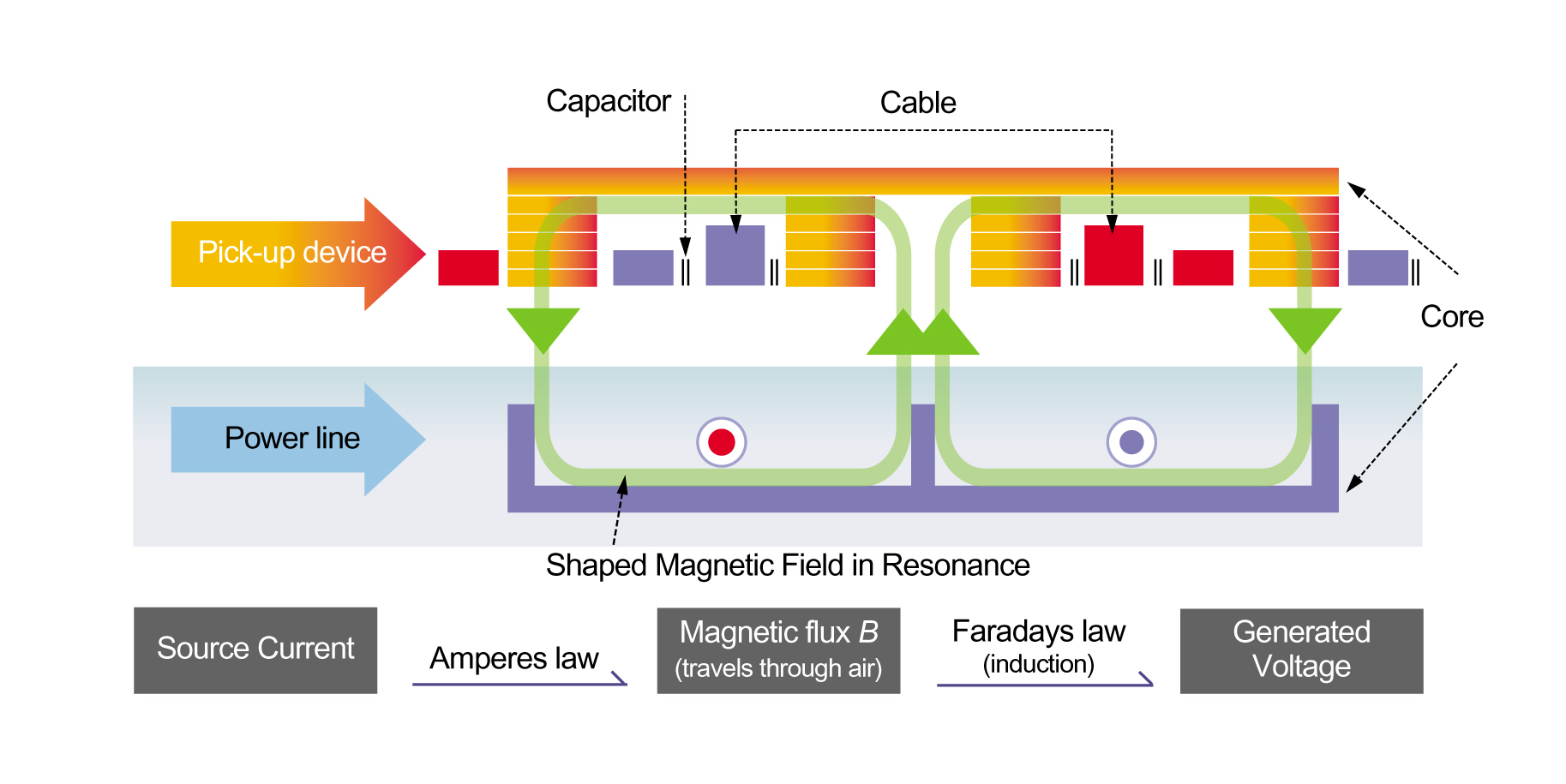 KAIST Develops Wireless Power Transfer Technology for High Capacity Transit
KAIST and the Korea Railroad Research Institute (KRRI) have developed a wireless power transfer technology that can be applied to high capacity transportation systems such as railways, harbor freight, and airport transportation and logistics. The technology supplies 60 kHz and 180 kW of power remotely to transport vehicles at a stable, constant rate.
KAIST and KRRI successfully showcased the wireless power transfer technology to the public on February 13, 2013 by testing it on the railroad tracks at Osong Station in Korea. Originally, this technology was developed as part of an electric vehicle system introduced by KAIST in 2011 known as the On-line Electric Vehicle (OLEV).
OLEV does not need to be parked at a charging station to have a fully powered battery. It gets charged while running, idling, and parking, enabling a reduction in size of the reserve battery down to one-fifth of the battery on board a regular electric car. The initial models of OLEV, a bus and a tram, receive 20 kHz and 100 kW power at an 85% transmission efficiency rate while maintaining a 20cm air gap between the underbody of vehicle and the road surface. OLEV complies with the national and international standards of 62.5 mG, a safety net for electromagnetic fields. In July 2013, for the first time since its development, OLEV will run on a regular road, an inner city route in the city of Gumi, requiring 40 minutes of driving each way.
Today’s technology demonstration offers further support that OLEV can be utilized for large-scale systems. Professor Dong-Ho Cho, Director of Center for Wireless Power Transfer Technology Business Development at KAIST, explained the recent improvements to OLEV:
“We have greatly improved the OLEV technology from the early development stage by increasing its power transmission density by more than three times. The size and weight of the power pickup modules have been reduced as well. We were able to cut down the production costs for major OLEV components, the power supply, and the pickup system, and in turn, OLEV is one step closer to being commercialized.”
If trains receive power wirelessly, the costs of railway wear and tear will be dramatically reduced. There will be no power rails, including electrical poles, required for the establishment of a railway system, and accordingly, lesser space will be needed. Tunnels will be built on a smaller scale, lowering construction costs. In addition, it will be helpful to overcome major obstacles that discourage the construction of high speed railway systems such as noise levels and problems in connecting pantograph and power rails.
KAIST and KRRI plan to apply the wireless power transfer technology to trams in May and high speed trains in September.
2013.03.19 View 13813
KAIST Develops Wireless Power Transfer Technology for High Capacity Transit
KAIST and the Korea Railroad Research Institute (KRRI) have developed a wireless power transfer technology that can be applied to high capacity transportation systems such as railways, harbor freight, and airport transportation and logistics. The technology supplies 60 kHz and 180 kW of power remotely to transport vehicles at a stable, constant rate.
KAIST and KRRI successfully showcased the wireless power transfer technology to the public on February 13, 2013 by testing it on the railroad tracks at Osong Station in Korea. Originally, this technology was developed as part of an electric vehicle system introduced by KAIST in 2011 known as the On-line Electric Vehicle (OLEV).
OLEV does not need to be parked at a charging station to have a fully powered battery. It gets charged while running, idling, and parking, enabling a reduction in size of the reserve battery down to one-fifth of the battery on board a regular electric car. The initial models of OLEV, a bus and a tram, receive 20 kHz and 100 kW power at an 85% transmission efficiency rate while maintaining a 20cm air gap between the underbody of vehicle and the road surface. OLEV complies with the national and international standards of 62.5 mG, a safety net for electromagnetic fields. In July 2013, for the first time since its development, OLEV will run on a regular road, an inner city route in the city of Gumi, requiring 40 minutes of driving each way.
Today’s technology demonstration offers further support that OLEV can be utilized for large-scale systems. Professor Dong-Ho Cho, Director of Center for Wireless Power Transfer Technology Business Development at KAIST, explained the recent improvements to OLEV:
“We have greatly improved the OLEV technology from the early development stage by increasing its power transmission density by more than three times. The size and weight of the power pickup modules have been reduced as well. We were able to cut down the production costs for major OLEV components, the power supply, and the pickup system, and in turn, OLEV is one step closer to being commercialized.”
If trains receive power wirelessly, the costs of railway wear and tear will be dramatically reduced. There will be no power rails, including electrical poles, required for the establishment of a railway system, and accordingly, lesser space will be needed. Tunnels will be built on a smaller scale, lowering construction costs. In addition, it will be helpful to overcome major obstacles that discourage the construction of high speed railway systems such as noise levels and problems in connecting pantograph and power rails.
KAIST and KRRI plan to apply the wireless power transfer technology to trams in May and high speed trains in September.
2013.03.19 View 13813 -
 KAIST Alumni Association Selects 'Proud Alums'
KAIST Alumni Association selected ‘Proud Alums’ who have contributed to the development of Korea and society and brought honor to KAIST.
The Alums selected were: CEO of Hyundai Heavy Industry Lee Jae Seong, Vice President of SK Hynix Park Sang Hoon, President of Samsung Display Kim Ki Nam, Director of Korea Research Institute of Standards and Science Kang Dae Lim, and President of Dawonsys Park Sun Soon.
Lee Jae Song (Department of Industrial and Systems Engineering, M.S. 3rd) has led Hyundai Heavy Industries through innovation and had contributed in the development of Korea and oversaw the growth of Hyundai Heavy Industries to number 1 in Shipbuilding.
Park Sang Hoon (Biological and Chemical Engineering, M.S. 5th) has led SK Hynix in the fields of energy, chemical and biological medicine and oversaw the development of world class R&D and production technologies to aid the development of Korea.
Kim Ki Nam (Electrical and Electronic Engineering, M.S. 9th) has led the development of innovative semiconductor technologies thereby helping strengthening the competitiveness of Korean semiconductor industry.
Kang Dae Lim (Mechanical Engineering, Ph.D. 1994 graduate) has helped in the development of Korean science and technology by leading the field of measurement standardization as Chairman of International Measurement Confederation and Chairman of Korea Association of Standards & Testing Organizations.
Park Sun Soon (Electrical and Electronic Engineering, M.S. 12th) has succeeded in advancing the field of electronics by pioneering the field of creative technology.
2013.01.22 View 11292
KAIST Alumni Association Selects 'Proud Alums'
KAIST Alumni Association selected ‘Proud Alums’ who have contributed to the development of Korea and society and brought honor to KAIST.
The Alums selected were: CEO of Hyundai Heavy Industry Lee Jae Seong, Vice President of SK Hynix Park Sang Hoon, President of Samsung Display Kim Ki Nam, Director of Korea Research Institute of Standards and Science Kang Dae Lim, and President of Dawonsys Park Sun Soon.
Lee Jae Song (Department of Industrial and Systems Engineering, M.S. 3rd) has led Hyundai Heavy Industries through innovation and had contributed in the development of Korea and oversaw the growth of Hyundai Heavy Industries to number 1 in Shipbuilding.
Park Sang Hoon (Biological and Chemical Engineering, M.S. 5th) has led SK Hynix in the fields of energy, chemical and biological medicine and oversaw the development of world class R&D and production technologies to aid the development of Korea.
Kim Ki Nam (Electrical and Electronic Engineering, M.S. 9th) has led the development of innovative semiconductor technologies thereby helping strengthening the competitiveness of Korean semiconductor industry.
Kang Dae Lim (Mechanical Engineering, Ph.D. 1994 graduate) has helped in the development of Korean science and technology by leading the field of measurement standardization as Chairman of International Measurement Confederation and Chairman of Korea Association of Standards & Testing Organizations.
Park Sun Soon (Electrical and Electronic Engineering, M.S. 12th) has succeeded in advancing the field of electronics by pioneering the field of creative technology.
2013.01.22 View 11292